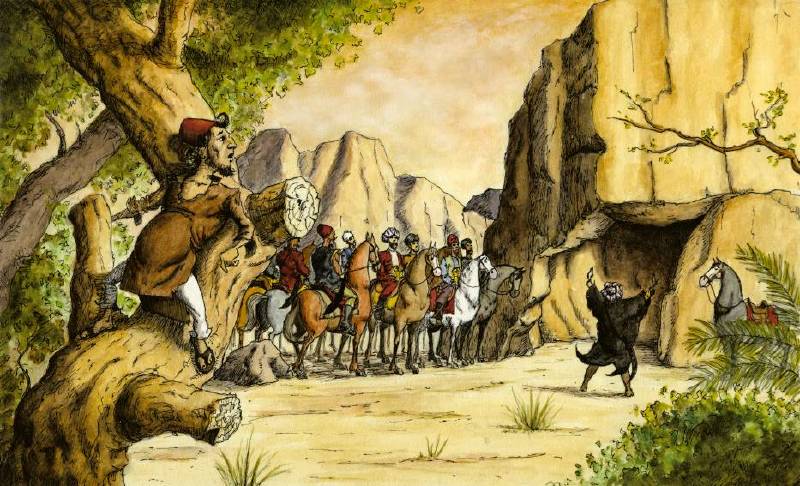Open Sesame on:
[Wikipedia]
[Google]
[Amazon]
 "Open sesame" (french: Sésame, ouvre-toi; ar, افتح يا سمسم) is a magical phrase in the story of "
"Open sesame" (french: Sésame, ouvre-toi; ar, افتح يا سمسم) is a magical phrase in the story of "
"Open Sesame"
in ''Beiträge zur assyriologie und semitischen Sprachwissenschaft'' 10:2, 1927, p. 165''ff''. Originally presented at the meeting of the
 "Open sesame" (french: Sésame, ouvre-toi; ar, افتح يا سمسم) is a magical phrase in the story of "
"Open sesame" (french: Sésame, ouvre-toi; ar, افتح يا سمسم) is a magical phrase in the story of "Ali Baba and the Forty Thieves
"Ali Baba and the Forty Thieves" ( ar, علي بابا والأربعون لصا) is a folk tale from the '' One Thousand and One Nights''. It was added to the collection in the 18th century by its French translator Antoine Galland, who hear ...
" in Antoine Galland's version of '' One Thousand and One Nights''. It opens the mouth of a cave in which forty thieves have hidden a treasure.
Documentation
The phrase first appears in Antoine Galland's French translation of '' One Thousand and One Nights'' (1704–1717) as ''Sésame, ouvre-toi'' (English, "Sesame, open yourself"). In the story,Ali Baba
"Ali Baba and the Forty Thieves" ( ar, علي بابا والأربعون لصا) is a folk tale from the '' One Thousand and One Nights''. It was added to the collection in the 18th century by its French translator Antoine Galland, who heard ...
overhears one of the 40 thieves saying "open sesame". His brother later cannot remember the phrase, and confuses it with the names of grains other than sesame, becoming trapped in the magic cave.
Galland's phrase has been variously translated from the French into English as "Sesame, open", "Open, sesame" and "Open, O sesame".
Classification
Open sesame has been classified by Stith Thompson as motif element D1552.2, "Mountain opens to magic formula".Origin
Sesame seeds grow in a seed pod that splits open when it reaches maturity, and the phrase possibly alludes to unlocking of treasures, although it is not certain that the word "sesame" actually refers to the sesame plant or seed. Other theories include: * Sesame is a reduplication of theHebrew
Hebrew (; ; ) is a Northwest Semitic language of the Afroasiatic language family. Historically, it is one of the spoken languages of the Israelites and their longest-surviving descendants, the Jews and Samaritans. It was largely preserved ...
''šem'' 'name', i.e. God, or a kabbalistic word representing the Talmud
The Talmud (; he, , Talmūḏ) is the central text of Rabbinic Judaism and the primary source of Jewish religious law ('' halakha'') and Jewish theology. Until the advent of modernity, in nearly all Jewish communities, the Talmud was the ce ...
ic ''šem-šāmayīm'' ("shem-shamayim"), 'name of heaven'.
* Sesame is connected to Babylonian magic
Magic or Magick most commonly refers to:
* Magic (supernatural), beliefs and actions employed to influence supernatural beings and forces
* Ceremonial magic, encompasses a wide variety of rituals of magic
* Magical thinking, the belief that unrela ...
practices which used sesame oil
Sesame oil is an edible vegetable oil derived from sesame seeds. The oil is one of the earliest-known crop-based oils. Worldwide mass modern production is limited due to the inefficient manual harvesting process required to extract the oil. ...
.Theodor Nöldeke
Theodor Nöldeke (; born 2 March 1836 – 25 December 1930) was a German orientalist and scholar. His research interests ranged over Old Testament studies, Semitic languages and Arabic, Persian and Syriac literature. Nöldeke translated several ...
in ''Zeitschrift für Assyriologie'' (1914), as reported in Haupt.
See also
*Abracadabra
''Abracadabra'' is a magic word, historically used as an incantation on amulets and common today in stage magic.
Etymology
''Abracadabra'' is of unknown origin, but according to the ''Oxford English Dictionary'', its first known occurrence ...
* Barbarous names
* Hocus pocus
*Sesame Street
''Sesame Street'' is an American educational children's television series that combines live-action, sketch comedy, animation and puppetry. It is produced by Sesame Workshop (known as the Children's Television Workshop until June 2000) ...
Notes
Bibliography
* Paul Haupt"Open Sesame"
in ''Beiträge zur assyriologie und semitischen Sprachwissenschaft'' 10:2, 1927, p. 165''ff''. Originally presented at the meeting of the
American Oriental Society
The American Oriental Society was chartered under the laws of Massachusetts on September 7, 1842. It is one of the oldest learned societies in America, and is the oldest devoted to a particular field of scholarship.
The Society encourages basi ...
, Washington, April 15, 1916.
{{One Thousand and One Nights
One Thousand and One Nights
English phrases
Magic words